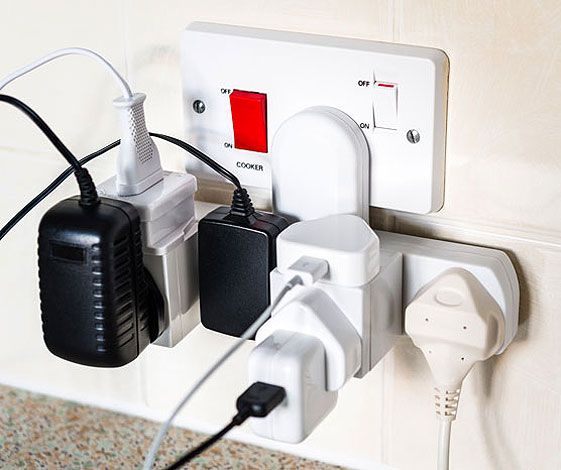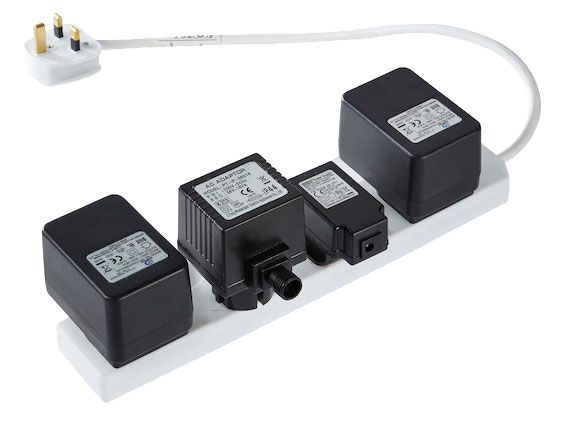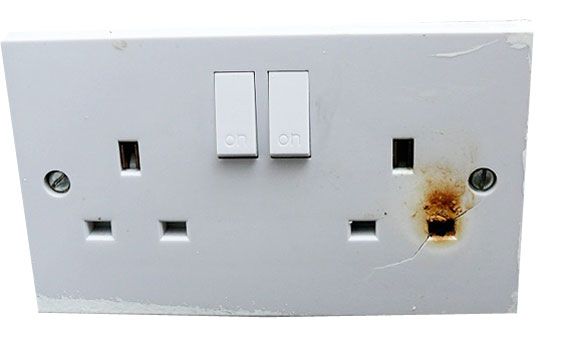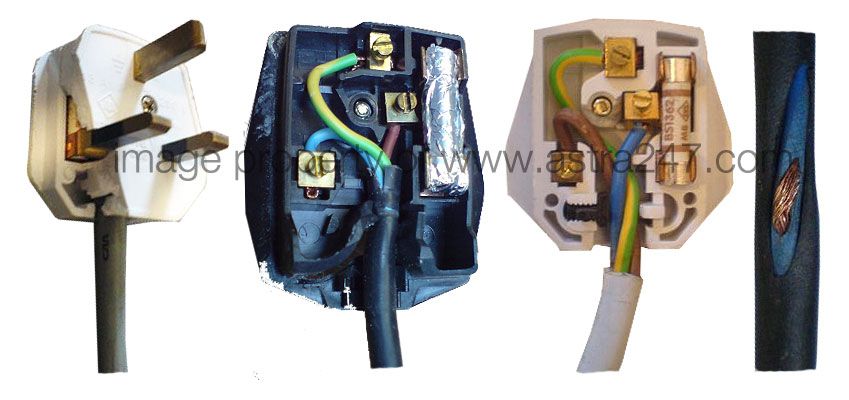Here are a few useful points to help keep you and your property safe.
1) Overloading of sockets has got to be one of the most common causes of fires, keep one plug in one socket. If you have not got enough socket outlets here are a few choices:
- Pay a qualified electrician to install extra sockets or one of our converter sockets that are fused correctly.
- Fit a trailing lead that is fused correctly, lay it on the floor flat preferably on non-combustible material. Don't then use additional adaptors in this, stick to one plug - one socket. If you are using heavy transformer plugs these can emit heat so try to use them plugged in to the trailing socket on the floor and alternate with a standard plug so they are not bunched where possible. Using a 4 way trailing socket you would have transformer - plug - transformer - plug or 1 at each end. Once set up keep an eye on them initially to see what is giving off heat and adjust accordingly.

Above: Not a good example and a fire waiting to happen. Note the heavy transformer could potentially pull the adaptor loose with its weight.

Above: You will instantly say "You have just advised against putting transformers in all 4 outlets!" If you look carefully this is a special socket which leaves additional space between each adaptor. If you have to use four transformer plugs try to source one like this or stick to our advice above.
2) Sockets or plugs that have developed scorch marks on them. This is usually down to overheating which happens when the socket/plug is overloaded and/or a loose pin in the plugtop or within the socket. Check the plugtop first and if that has all terminals tight and correct, ask an electrician to check/replace the socket and investigate further.

Above: Typical example of a pin that has been overheating, the socket is damaged and it is very probable the connection inside has potentially been misaligned or loosened.
3) Don't ignore the following, they are usually an issue starting to raise its head:
Fuses or circuit breakers that blow or trip for no reason
Flickering lights or an appliance that goes on/off without touching it
Smell of burning or awful fishy smell around lights etc This is usually the smell of bakelite
4) Cables, leads, plugs and cords need to be inspected regularly, don't leave flexes hanging out of plugs and never run mains cables or flexes under carpets, rugs or flooring.

Above: Rogues gallery, damaged plugs need to be replaced immediately, never use tin foil as a fuse replacement, always use the cord grip and keep cable terminated inside the plug and last but not least: always replace damaged or frayed flexes or cables.
5) Always use the correct fuse size, if in doubt check manual, ask retailer for advice and if in doubt start with a 3a.
6) Never use tumble dryers when your not home or asleep, regularly clean the air filter of fluff to prevent fires.
7) Charging devices are now a common cause of fires; always use the correct charger or charging device, beware of cheap copies as some are potentially lethal. Follow manufacturers guidelines when using electronic cigarettes. Modification should never be done.
8) Electric blankets deteriorate after time, it is recommended to replace them after 10 years.
9) If you think you are getting leakage or a minor shock from any exposed metalwork always switch off the mains and consult an electrician.
10) Keep portable electric heaters away from any combustible material, if you are using any that are over 2kw or 2000 watts we recommend wall mounting in to a switched fused spur connection unit.
All info above is for guidance only, we accept no responsibility or liability. STAY SAFE, SLEEP SAFE